Items filtered by date: April 2024
Corns Caused by Friction
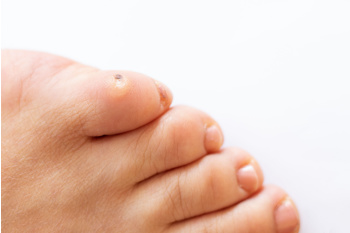 Corns on the feet are often the result of rubbing and mechanical stress on the skin. When there is repetitive friction on a certain area of the foot, the skin may respond by thickening and forming a hardened, raised bump known as a corn. Bony prominences, such as the toes or the sides of the feet, are more susceptible to corn development caused by rubbing against the shoes. Corns can also form in response to wearing ill-fitting footwear, high heels, or possibly from having foot deformities that alter the distribution of weight and pressure on the feet. While corns themselves are not usually harmful, they can cause discomfort or pain, especially when walking or wearing shoes. Podiatrists, or foot doctors, can address corns through various treatments, such as trimming, padding, or orthotic devices to provide relief. If you are struggling with corns on the feet, it is suggested that you consult a podiatrist for personalized treatment options.
Corns on the feet are often the result of rubbing and mechanical stress on the skin. When there is repetitive friction on a certain area of the foot, the skin may respond by thickening and forming a hardened, raised bump known as a corn. Bony prominences, such as the toes or the sides of the feet, are more susceptible to corn development caused by rubbing against the shoes. Corns can also form in response to wearing ill-fitting footwear, high heels, or possibly from having foot deformities that alter the distribution of weight and pressure on the feet. While corns themselves are not usually harmful, they can cause discomfort or pain, especially when walking or wearing shoes. Podiatrists, or foot doctors, can address corns through various treatments, such as trimming, padding, or orthotic devices to provide relief. If you are struggling with corns on the feet, it is suggested that you consult a podiatrist for personalized treatment options.
If you have any concerns regarding your feet and ankles, contact Harvey Jacobs, DPM of Quality Foot Care Center. Our doctor will treat your foot and ankle needs.
Corns: What Are They? and How Do You Get Rid of Them?
Corns can be described as areas of the skin that have thickened to the point of becoming painful or irritating. They are often layers and layers of the skin that have become dry and rough, and are normally smaller than calluses.
Ways to Prevent Corns
There are many ways to get rid of painful corns such as wearing:
- Well-fitting socks
- Comfortable shoes that are not tight around your foot
- Shoes that offer support
Treating Corns
Treatment of corns involves removing the dead skin that has built up in the specific area of the foot. Consult with Our doctor to determine the best treatment option for your case of corns.
If you have any questions please feel free to contact our office located in Somerset, NJ . We offer the newest diagnostic and treatment technologies for all your foot and ankle needs.
Custom Orthotics For Foot and Heel Pain
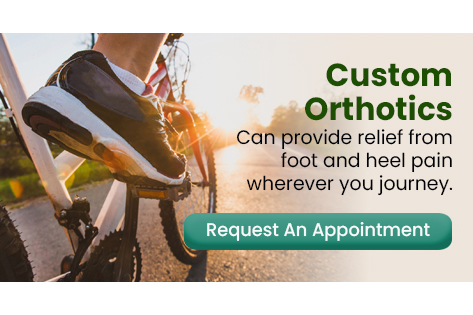
Step into relief and reclaim your mobility! Foot and heel pain can be a thing of the past with the right Custom Orthotics. Customized to your unique foot structure, they provide the support and alignment needed to alleviate discomfort. Whether you're walking, running, or simply standing, Custom Orthotics ensure every step is cushioned and pain-free. Don't let foot ailments dictate your day. With Custom Orthotics, embrace a world of comfort and freedom. Call today to schedule an appointment.
Foot Injuries From Rock Climbing
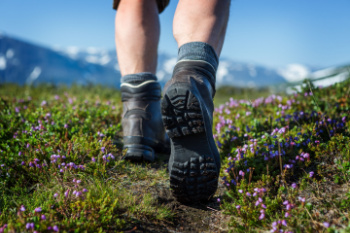
Rock climbing, an exhilarating sport enjoyed by many, can also pose risks of foot injuries, both acute and chronic. Acute injuries often occur due to sudden trauma or overuse during climbs. Common acute foot injuries include sprains, strains, fractures, and abrasions, often resulting from slips, falls, or improper foot placements. Climbing shoes, designed for precision and grip, can exacerbate foot issues if they fit too tightly or lack proper support. Wearing ill-fitting shoes may lead to blisters, corns, or ingrown toenails, while prolonged use can contribute to conditions like plantar fasciitis or tendonitis. If you participate in rock climbing and have sustained a foot injury, it is suggested that you schedule an appointment with a podiatrist for diagnosis and treatment. These healthcare professionals can also provide guidance on proper shoe fit, and recommend supportive inserts, and custom-made orthotics.
Sports related foot and ankle injuries require proper treatment before players can go back to their regular routines. For more information, contact Harvey Jacobs, DPM of Quality Foot Care Center. Our doctor can provide the care you need to keep you pain-free and on your feet.
Sports Related Foot and Ankle Injuries
Foot and ankle injuries are a common occurrence when it comes to athletes of any sport. While many athletes dismiss the initial aches and pains, the truth is that ignoring potential foot and ankle injuries can lead to serious problems. As athletes continue to place pressure and strain the area further, a mild injury can turn into something as serious as a rupture and may lead to a permanent disability. There are many factors that contribute to sports related foot and ankle injuries, which include failure to warm up properly, not providing support or wearing bad footwear. Common injuries and conditions athletes face, including:
- Plantar Fasciitis
- Plantar Fasciosis
- Achilles Tendinitis
- Achilles Tendon Rupture
- Ankle Sprains
Sports related injuries are commonly treated using the RICE method. This includes rest, applying ice to the injured area, compression and elevating the ankle. More serious sprains and injuries may require surgery, which could include arthroscopic and reconstructive surgery. Rehabilitation and therapy may also be required in order to get any recovering athlete to become fully functional again. Any unusual aches and pains an athlete sustains must be evaluated by a licensed, reputable medical professional.
If you have any questions please feel free to contact our office located in Somerset, NJ . We offer the newest diagnostic and treatment technologies for all your foot and ankle needs.
Do Your Child's Feet Hurt?
Quality Foot Orthotics
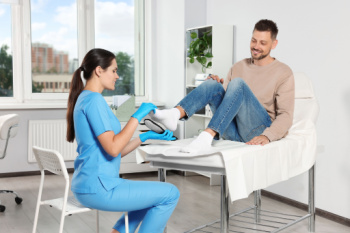
The quality of foot orthotics is critical for their effectiveness in providing support and addressing various foot issues. A well-made orthotic should exhibit strength to withstand daily wear and tear while maintaining its structural integrity over time. It should also feature contours that precisely fit the individual's foot shape, ensuring optimal support and comfort. Additionally, balance is essential, with the orthotic promoting proper weight distribution and alignment to alleviate pressure points and prevent further complications. Custom-made orthotics prescribed by podiatrists offer superior quality compared to off-the-shelf alternatives. Podiatrists conduct a thorough assessment to understand the patient's unique foot structure, biomechanics, and specific needs. They use this information to design orthotics that are tailored to address the individual's concerns effectively. Through precise customization and expert craftsmanship, custom-made orthotics by podiatrists ensure the highest level of quality, leading to improved foot health, enhanced comfort, and long-term relief from pain and discomfort. If you are experiencing continued foot problems, it is suggested that you make an appointment with a podiatrist to discuss how personalized orthotics can help you.
The benefits of custom orthotics are far-reaching and can make a significant impact on your daily life. Whether you are an athlete looking to enhance your performance, a healthcare worker on your feet every day, someone who experiences chronic foot pain, or someone who wants to improve their overall comfort and well-being, custom orthotics can be a game changer.
Custom orthotics provide support, stability, and relief for a variety of foot conditions ranging from flat feet to heel pain. They can even help prevent injuries and address more severe foot concerns, such as plantar fasciitis and diabetic foot issues.
Contact Harvey Jacobs, DPM at Quality Foot Care Center to create tailored orthotics for you and enjoy a higher quality of life, reduced pain, and increased mobility. With the right orthotics, you can continue doing the things you love, whether it’s running, dancing, or simply walking comfortably without discomfort.
If you are suffering from foot discomfort or have concerns about your foot health, do not hesitate to contact Harvey Jacobs, DPM at Quality Foot Care Center to explore the benefits of orthotics for you. Your feet are the foundation of your body and investing in their well-being can lead to a happier, healthier, and more active lifestyle. Your feet will thank you!
If you have any questions please contact our office located in Somerset, NJ . We offer the newest diagnostic and treatment technologies for all your foot and ankle needs.
What Happens During Bunion Surgery
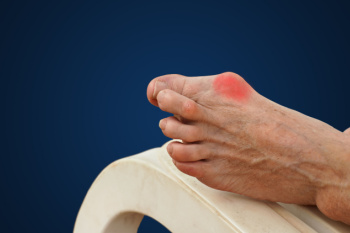 The goal of bunion surgery is to correct the deformity of the big toe that causes pain and discomfort. The procedure generally involves an incision in the foot near the big toe to access the bunion. The bones, ligaments, tendons, and nerves are then realigned to correct the deformity. In some cases, small pieces of bone might be removed, or the bones may be cut and realigned with pins or plates to maintain the correct position. The specific technique used depends on the severity of the bunion and the patient's foot structure. After surgery, the foot is typically bandaged. Patients may need to wear a special boot or shoe to protect the foot and keep it in the correct position during the healing process. Recovery time varies, but it generally involves several weeks of limited movement to allow the foot to heal properly. Follow-up visits with the podiatrist are important to monitor the healing process and begin rehabilitation exercises to restore strength and mobility to the foot. If you have a bunion, it is suggested that you schedule an appointment with a podiatrist to discuss whether bunion surgery is right for you.
The goal of bunion surgery is to correct the deformity of the big toe that causes pain and discomfort. The procedure generally involves an incision in the foot near the big toe to access the bunion. The bones, ligaments, tendons, and nerves are then realigned to correct the deformity. In some cases, small pieces of bone might be removed, or the bones may be cut and realigned with pins or plates to maintain the correct position. The specific technique used depends on the severity of the bunion and the patient's foot structure. After surgery, the foot is typically bandaged. Patients may need to wear a special boot or shoe to protect the foot and keep it in the correct position during the healing process. Recovery time varies, but it generally involves several weeks of limited movement to allow the foot to heal properly. Follow-up visits with the podiatrist are important to monitor the healing process and begin rehabilitation exercises to restore strength and mobility to the foot. If you have a bunion, it is suggested that you schedule an appointment with a podiatrist to discuss whether bunion surgery is right for you.
Foot surgery is sometimes necessary to treat a foot ailment. To learn more, contact Harvey Jacobs, DPM of Quality Foot Care Center. Our doctor will assist you with all of your foot and ankle needs.
When Is Surgery Necessary?
Foot and ankle surgery is generally reserved for cases in which less invasive, conservative procedures have failed to alleviate the problem. Some of the cases in which surgery may be necessary include:
- Removing foot deformities like bunions and bone spurs
- Severe arthritis that has caused bone issues
- Cosmetic reconstruction
What Types of Surgery Are There?
The type of surgery you receive will depend on the nature of the problem you have. Some of the possible surgeries include:
- Bunionectomy for painful bunions
- Surgical fusion for realignment of bones
- Neuropathy decompression surgery to treat nerve damage
Benefits of Surgery
Although surgery is usually a last resort, it can provide more complete pain relief compared to non-surgical methods and may allow you to finally resume full activity.
Surgical techniques have also become increasingly sophisticated. Techniques like endoscopic surgery allow for smaller incisions and faster recovery times.
If you have any questions please feel free to contact our office located in Somerset, NJ . We offer the newest diagnostic and treatment technologies for all your foot and ankle needs.
Fit Shoes Properly to Avoid Foot Conditions
 Properly fitting shoes help you maintain foot health and avoid a range of foot conditions, including bunions, calluses, and plantar fasciitis. To ensure that your shoes fit correctly, start by shopping in the late afternoon or evening, as feet tend to swell throughout the day. This will help you find a size that accommodates your feet when they are at their largest. Make sure to have both feet measured, as it is common for one foot to be slightly larger than the other. Choose the size that fits the larger foot comfortably. There should be about a thumb's width of space between the end of your longest toe and the front of the shoe to allow for movement and expansion as you walk. The shoe should fit snugly around the heel and midfoot, without being too tight. This will prevent slippage that could lead to blisters or calluses. Choose shoes with a wide toe box that allows your toes to spread naturally without constriction. Also, consider the shoe's material and arch support, especially if you have specific foot conditions or needs. Podiatrists can provide suggestions for the best shoes for your feet, especially if you are suffering from particular foot conditions. It is suggested that you discuss this topic with a podiatrist to reduce the risk of developing foot problems and enhance your overall foot comfort and health.
Properly fitting shoes help you maintain foot health and avoid a range of foot conditions, including bunions, calluses, and plantar fasciitis. To ensure that your shoes fit correctly, start by shopping in the late afternoon or evening, as feet tend to swell throughout the day. This will help you find a size that accommodates your feet when they are at their largest. Make sure to have both feet measured, as it is common for one foot to be slightly larger than the other. Choose the size that fits the larger foot comfortably. There should be about a thumb's width of space between the end of your longest toe and the front of the shoe to allow for movement and expansion as you walk. The shoe should fit snugly around the heel and midfoot, without being too tight. This will prevent slippage that could lead to blisters or calluses. Choose shoes with a wide toe box that allows your toes to spread naturally without constriction. Also, consider the shoe's material and arch support, especially if you have specific foot conditions or needs. Podiatrists can provide suggestions for the best shoes for your feet, especially if you are suffering from particular foot conditions. It is suggested that you discuss this topic with a podiatrist to reduce the risk of developing foot problems and enhance your overall foot comfort and health.
Finding a properly-fitting shoe is important in reducing injuries and preventing foot problems. For more information about treatment, contact Harvey Jacobs, DPM from Quality Foot Care Center. Our doctor will treat your foot and ankle needs.
Proper Shoe Fitting
A common concern when it comes to foot health, having properly fitted shoes can help prevent injuries to the foot. Out feet affect our posture and gait, which in turn affects the biomechanics and overall bodily structure. With 33 joints, 26 bones, and over 100 ligaments, the potential for serious injury is much greater than one realizes. Although the feet cease growth in adulthood, they still change shape as they mature. Here are some factors to consider when it comes to investing in proper fitting shoes:
- Be sure the shoes fit correctly right away
- Ensure the ball of your foot fits comfortably in the widest portion of the shoes
- Even though they may look fashionable, improper fitting shoes can either create adverse conditions or exacerbate existing ones you may already have
- Walk along a carpeted surface to ensure the shoes comfortably fit during normal activity
Keeping in mind how shoes fit the biomechanics of your body, properly-fitting shoes are vitally important. Fortunately, it is not difficult to acquire footwear that fits correctly. Be sure to wear shoes that support the overall structure of your body. Do your feet a favor and invest in several pairs of well-fitted shoes today.
If you have any questions please feel free to contact our office located in Somerset, NJ . We offer the newest diagnostic and treatment technologies for all your foot and ankle needs.

